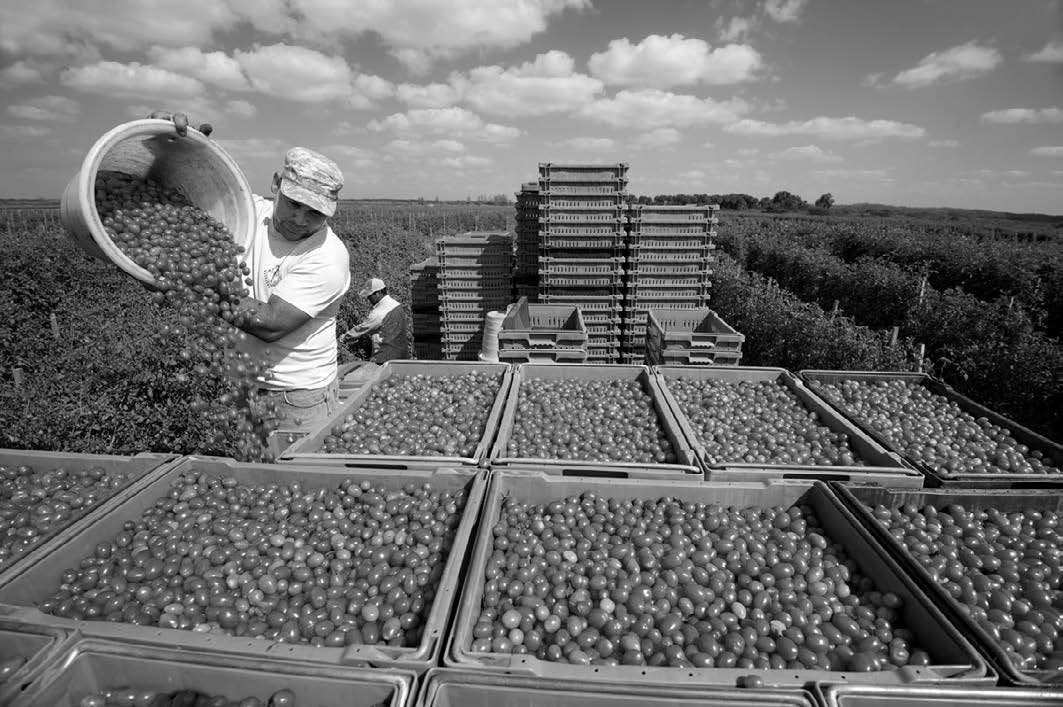Anaïs Beddard grew up at Lady Moon Farms playing in farm fields, working in the old oak grove packing shed, and cultivating genuine friendships with farm employees and their families.
Each employee is part of the family at Lady Moon Farms. With a team of nearly 300 workers, the Beddard family can’t fit them all at the dinner table these days. If they could, they certainly would.
From the time Chris and Tom Beddard embarked on this journey together nearly 30 years ago, they have prioritized the lives of their farmworkers as highly as the soil.
What started as five acres and a dream is now the largest organic vegetable operation east of the Mississippi, with nine farms in three states (Pennsylvania, Georgia and Florida) and over 2,600 tillable acres.
This year, Tom will receive the Rodale Institute’s esteemed 2017 Organic Pioneer Award—recognition of their successful path.
Model farmers, the Beddards have maintained a deep respect for their workers as a core guiding principle. Social justice is a pillar of the organic systems plan they use to guide every decision made at Lady Moon.
Satisfied workers are an invaluable part of their sustainable whole farm system. Employees receive annual raises, paid lunches, vacation, holidays, bonuses, and promotions. Each of the five farms is managed by a worker who was once a harvester or packer.
Lady Moon provides consistent, year-round employment. In turn, their committed employees are the farms’ greatest asset—working hard and dedicating their lives to growing healthy, delicious food.
Their standards set a new precedent for an industry that too often relies on unscrupulous practices. It is common for contractors to bus in different crews of laborers daily, or seasonally, with precarious work contracts.
For Anaïs, her parents’ commitment to social justice instilled a deep understanding that the life of the farm and the life of the farm worker are mutually dependent. “If we didn’t have migrant labor, there simply wouldn’t be any fresh fruits and vegetables on family tables. It would be great if more people understood that,” says Anaïs.
Farm workers’ rights are a large part of the Beddard’s legacy, and something Anaïs is proud to uphold—carrying forward her parent’s passion, while providing healthy food that is good for the planet.
But the landscape of organic farming is shifting, and Anaïs will face different obstacles than her parents did. Today’s challenges include major labor shortages and the bravado of industrial agriculture elbowing its way into the organic market.
Many large-scale organic farms in the U.S. are operated by conventional players, driven foremost by profits, at the expense of workers and the land.
Industrial farms often look like barren land, their soil and ecology weakened by high chemical and energy inputs. Lady Moon’s farms stand in stark contrast. In his authoritative exposé “Tomatoland,” investigative food journalist Barry Estabrook highlights the practices of Lady Moon Farms as a model alternative to exploitative and toxic agribusiness system failures.
Lady Moon started out organic and they started out small. Strategic growth has allowed them to absorb changes in the organic market. After expanding their initial Pennsylvania-based operation to include more farmland in Florida and eventually Georgia, their seasonal farming operation transformed into a year-round growing enterprise.
This growth earned them their wings. By minimizing gaps in production, stabilizing supply for a wholesale market, and building strong commercial partnerships, they were able to expand and stay true to their core values.
Today, all of the produce in the fields is spoken for, purchased wholesale by a small network of large distributors. Lady Moon has built a reputation for a “perfect pack,” the best looking and healthiest organic produce on the shelves.
What doesn’t get shipped to national chains, independent grocers, co-ops, and other retail outlets is donated to the local community, another sustainability directive outlined in their organic systems plan.
Lady Moon Farms believes as many people as possible should have access to healthy food. They donated a whopping one million pounds of produce to local food banks and other nonprofit organizations in 2016 alone.
Ethical growing at this scale is a challenge, but Lady Moon demonstrates that it can be done successfully and sustainably.
When asked what advice she has for farmers that want to scale up, Anaïs says, “Whether you’re fifth generation or a new farmer, to be successful at this industry takes passion.”
Anaïs didn’t dream of being a farmer; her parents did. But, after much consideration, she returned home to the farm two years ago and now works in process improvement—learning and teaching how to run the business more efficiently.
With a background in analytics and finance, she wants young farmers to know that many different kinds of knowledge, skills, and experience are needed to run a successful farm business today.
The next generation of organic farming needs all types of passionate leaders ready to carry the torch and steer the organic movement into a boldly regenerative future.
There is hope in the restorative economies, relationships, and communities being built by ethical organic farmers like the Beddards.
All farm life, from the soil microbes to the bees and workers, are supported by the decisions each of us makes to invest in the kind of authentic organic food and farming that Lady Moon provides.


